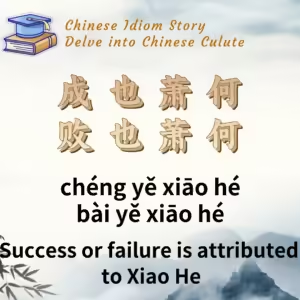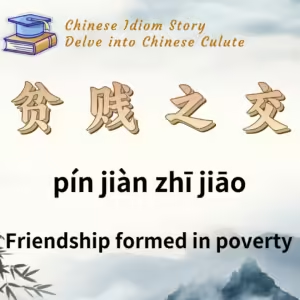
Chinese Idiom: 成也萧何,败也萧何 (Cheng Ye Xiao He, Bai Ye Xiao He)
English Translation: Success or failure is attributed to Xiao He
pīn yīn: chéng yě xiāo hé, bài yě xiāo hé
Idiom Meaning: This idiom refers to how the success or failure of a situation is solely determined by one person.
Historical Source: “Rong Zhai Xu Bi” (容斋续笔) by Song Dynasty writer Hong Mai, specifically the section “Xiao He Dai Han Xin” (萧何绐韩信).
Idiom Story:
A well-known story in Chinese folklore is “Xiao He Chasing Han Xin Under the Moon” (萧何月下追韩信). It recounts events from the late Qin Dynasty involving Han Xin, a talented military strategist from Huaiyin. Initially, he sought refuge with Xiang Yu but was not given a significant role. He then defected to Liu Bang and started as a low-ranking officer in charge of military supplies.
Xiao He, recognizing Han Xin’s extraordinary talent, recommended him to Liu Bang. However, Liu Bang, viewing Han Xin’s humble origins, was reluctant to promote him. Disheartened, Han Xin decided to leave. Upon hearing this, Xiao He quickly mounted his horse and pursued Han Xin to prevent his departure.
As Xiao He rode out, someone reported to Liu Bang that the Chancellor had fled, causing Liu Bang to panic as if he had lost his right-hand man. A couple of days later, Xiao He returned and explained to Liu Bang that he had not fled but had chased after Han Xin.
Liu Bang, skeptical, asked, “Why did you chase him?” Xiao He replied, “Han Xin is a rare talent for our nation. If you wish to rule the Han kingdom for long, you may not need him. But if you want to compete for the world, there is no one but Han Xin to strategize great matters.”
Convinced, Liu Bang appointed Han Xin as the General. Under Han Xin’s command, the army achieved significant victories, leading to the unification of the Han dynasty. Initially, Liu Bang awarded Han Xin the title of King of Qi. However, after defeating Xiang Yu, Liu Bang feared Han Xin’s power and used a surprise attack to strip him of his military command.
Later, Han Xin was accused of conspiracy and, under the pretense of a royal tour, Liu Bang had him arrested and reduced to the title of Marquis of Huaiyin. This incident caused Han Xin to become depressed and withdrawn from court activities.
In 197 BC, when Han Xin was unable to support Liu Bang’s campaign due to illness, he was falsely accused of plotting a rebellion alongside another general. Empress Lü, anxious about the accusations, conspired with Xiao He to deceive Han Xin into attending a celebration under the pretext of good news. Once he entered the palace, he was captured and executed.
Hong Mai commented on this tragic fate in his work, noting that while Han Xin became a great general due to Xiao He’s recommendation, he ultimately met his demise because of the same man. Hence, the saying “成也萧何,败也萧何” emerged, illustrating how one individual’s actions can lead to both success and failure.






